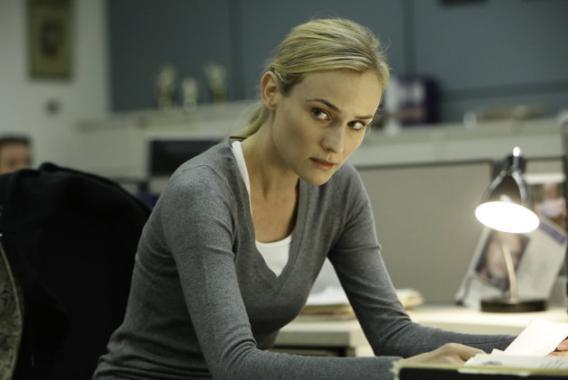The Bridge, FX’s new series about a politically motivated serial killer operating on the U.S.-Mexico border, is all about dualities: North and South, migrant and resident, corrupt and trustworthy, so on and so forth.
This pattern of contrasts has even played out in critics’ response to the show: There are those who label lead actress Diane Kruger’s performance as “exceptional,” while others peg her as “the weak link.” On this week’s Culture Gabfest, the panelists came down firmly on the negative side of the ledger: Julia Turner expressed a desire for Kruger’s character, Sonya Cross, to meet an early demise, while Dana Stevens dismissed Cross as “one of those quirk-laden detectives that is just straight off the formula books ever since Monk, or however long detectives on TV have had to have mental-illness quirks.”
I’m sympathetic to Dana’s complaint. As a longtime critic of the gimmickization of TV procedurals, it kills me that it’s pretty much impossible to do a regular old cop show these days. Why must all the new mysteries involve detectives with perfect memories or Ichabod Crane battling the Headless Horseman while a contemporary small-town sheriff desperately tries to work out what the hell’s going on?
Nevertheless, Kruger’s gotten a bum rap.
Yes, her character is cold and abrasive, but that’s of a piece with the show’s obsession with dualism. Her Mexican counterpart, played by Demian Bichir, is warm and instinctive. That leaves her El Paso detective to hold down formal and by-the-book.
Some writers complained that Cross’ condition wasn’t explicitly explained. While the FX press notes state that she has Asperger syndrome, the words autism and Asperger’s are never spoken on the show itself. This criticism seems ridiculous to me. Characters with autism are all over the television these days, and while the condition is sometimes labeled—especially in the case of children, as, for example, on Parenthood—it’s more frequently left unspecified.
Last week at the Television Critics Association gathering, I asked The Bridge’s executive producers, Meredith Stiehm and Elwood Reid, if they regretted following the example of the original Scandinavian version of the show and neglecting to mention Cross’ diagnosis. Both insisted they were glad that, while a network broadcaster would have forced them to insert an unrealistic line of dialogue stating that Sonya is autistic, FX allowed them leave it unsaid. As Stiehm put it, “It’s not how people function. You meet someone, you don’t say, ‘Hey, what’s wrong with you? What’s your diagnosis?’ You deal with them as they are. You get to know them, and maybe a few months later, you might find out.”
Unfortunately, just as Showtime’s Ray Donovan was dinged because its anti-hero storylines are now so overused that they’ve become tired clichés, Diane Kruger has taken more than her fair share of knocks because TV viewers are suffering from quirky-detective fatigue. But that isn’t the actor’s fault. Hate the game, not the player. Kruger is good.
Correction, Aug. 9, 2013: This piece originally misspelled “Asperger syndrome.”
